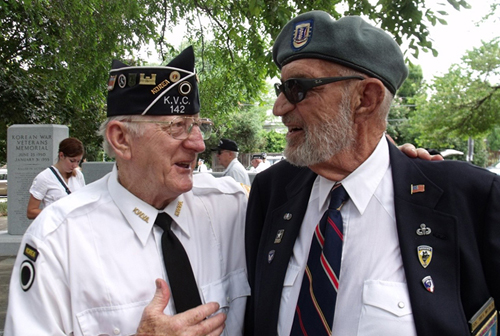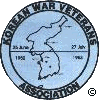As you may have noticed, the KWVA members of Frederick, MD have named their Chapter in honor of one of their outstanding members, Colonel William E. Weber. Recently, Col. Weber has turned 95. Priscilla Rall, who has been both a volunteer and director of the Frederick County Veterans History Project, took the oportunity to write an article about the Colonel and his dedication. The article follows:
Ninety-Five and Counting:
Veteran of WWII and Korea
There was a time when few thought that William Edward Weber would survive. In fact, his friend who fought with him on that snow-covered mountaintop in Korea was sure his was dead. But Weber fooled them all, not only did he survive, but he became the first double amputee to serve in the active army. Today, November 10, is the 95th birthday of this extraordinary man.
Bill was born in Chicago in 1925, but grew up in Milwaukee. When he was 17, he enlisted in the army, and was deployed with a glider infantry regiment assigned to the Pacific Theatre. He decided to make the military his career, and as a member of the 187th Airborne, he was sent to Korea. According to the book, Rakkasans, it was in the battle in September for Seoul after the Inchon landing, that Lt. Weber earned a Silver Star as well as receiving his first wound. He commented on his shoulder wound that it wasnít the kind that would put him down, and it was not much more that a needle stick, just a little larger. I think most of us would rather have a needle in our finger than a bullet!
In October, his 187th Regimental Combat Team (RCT) was ordered to drop behind enemy lines to cut off the retreating North Koreans. But bad weather delayed the jump, and the enemy used that time to disappear into the mountains. The most tragic result of the delay was that two trainloads of American POWs who the 187th had hoped to rescue were executed by the enemy rather than fall into friendly hands. In The Sunchon Tunnel Massacre Survivors, it notes that one of these 67 murdered men was MSG Clyde M. Starkey, from Hagerstown.
In late November, 1950, the Chinese entered the war and attacked the Allies across the entire peninsula and soon the US was in full retreat. Frederick Countyís PFC Paul Carty, Sgt. Lee Delauter and Cpl. Kenneth Ridge died at the Chosin Reservoir. Sgt. Norman Reid, PFC Manville Dagenhart, Cpl. Joseph Trail and Cpl. Jacob Ely are all still MIA near Kunu-ri.
Gen. Ridgeway needed to stop the Chinese, and the town of Wonju, because of its communication and road network, was crucial to both sides. On February 12th, the enemy hit the Allied armies hard. According to the book, Rakkasans, on February 14, K Company, 3rd Battalion of the 187th Airborne RTC commanded by Captain Weber was ordered to take Hill 342, the highest peak overlooking Wonju. Actually there were three peaks along the ridgeline, 340, 341 and 342. Intelligence had reported that the Chinese were getting ready to attack with a large force that was just 4 miles north of Wonju.
As Captain Weber formulated his plans of attack, he requested permission from Lt. Col. Delbert Munson to delay the attack until dark as the Chinese would not be expecting the Americans to attack at night. That was a tactic that they used! Weber and his men proceeded quickly and by 9 PM were up Hill 340 and Hill 341. Less than an hour later, they reached the crest of Hill 342. Weber anticipated the enemy would soon mount a counterattack, so they dug in and strengthened their perimeter. At 3 AM the Chinese struck, blowing whistles, horns and bugles. The captain ranged around his positions, constantly exposing himself to enemy fire. PFC Donald Boore, usually a recoilless rifle gunner, kept backing up and firing til he was at the top of the hill. Noticing a machinegun not operating, he disassembled it in the complete darkness and soon had it pumping lead.
Soon Weber realized his team had to move back to Hill 341 and form a tighter perimeter there. It was tough due to the many wounded that had to be carried to safety. The Chinese didnít let up. One grenade landed in the fox hole occupied by Cpt. Weber and his Forward Observer. Weber quickly reached for the grenade to throw it back, but it went off before it left his hand. He lost his right arm just below the elbow. His MSG quickly wrapped the stump, and Weber claims that he really didnít feel anything. His wound didnít stop Weber from continuing to command his company. But 20 minutes later, a mortar round landed in his Command Post, shattering his right leg just below the knee.

One veteran said later that it was the most terrible firefight that he had ever witnessed in three wars! The Chinese finally broke off their attack at dawn, and the wounded were taken off the steep mountain, sometimes having to wait as long as eight hours. Cpt. Weber was hit again in the hip and abdomen while at the aid station, eventually losing his right lower arm and right lower leg. But that did not stop this hard-headed trooper. He remained in the active army until he retired as a colonel.
His second act was to shepherd the National Korean War Memorial. He was in on its planning and then created a non-profit to fund repairs. His final effort has been to raise funds to complete the monument with a "Wall of Remembrance", listing all of those KIA and MIA.
He and his wife, Annelie, have worked tirelessly to have our country recognize the sacrifices made in the Korean War. His comrades in the Korean War Veterans of America have honored him by naming their Chapter 142 after him. Although he has given up skiing and horseback riding, he still gets around and continually represents the veterans of the Korean War so that it is no longer the "forgotten war."
Happy Birthday Col. Weber!
Priscilla Rall
And thank you, Priscilla, so that we never forget.





